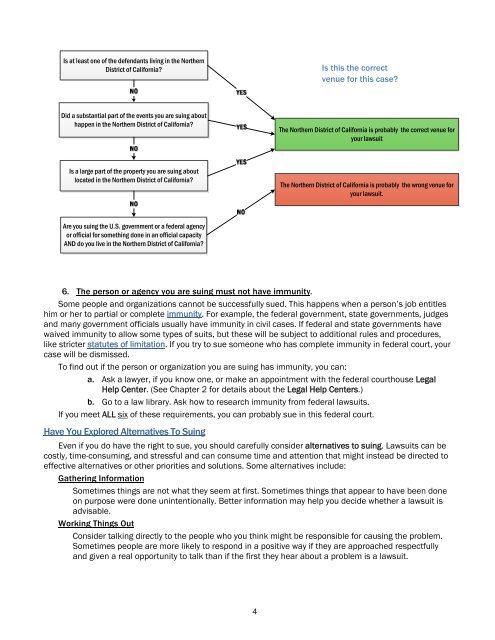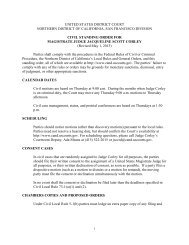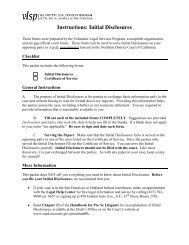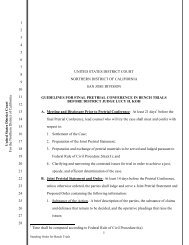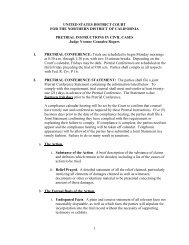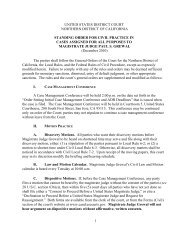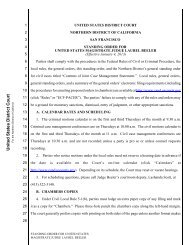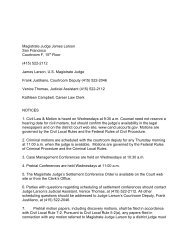Representing Yourself in Federal Court - United States District Court ...
Representing Yourself in Federal Court - United States District Court ...
Representing Yourself in Federal Court - United States District Court ...
You also want an ePaper? Increase the reach of your titles
YUMPU automatically turns print PDFs into web optimized ePapers that Google loves.
Is at least one of the defendants liv<strong>in</strong>g <strong>in</strong> the Northern<br />
<strong>District</strong> of California?<br />
Did a substantial part of the events you are su<strong>in</strong>g about<br />
happen <strong>in</strong> the Northern <strong>District</strong> of California?<br />
Is a large part of the property you are su<strong>in</strong>g about<br />
located <strong>in</strong> the Northern <strong>District</strong> of California?<br />
Are you su<strong>in</strong>g the U.S. government or a federal agency<br />
or official for someth<strong>in</strong>g done <strong>in</strong> an official capacity<br />
AND do you live <strong>in</strong> the Northern <strong>District</strong> of California?<br />
4<br />
The Northern <strong>District</strong> of California is probably the correct venue for<br />
your lawsuit<br />
The Northern <strong>District</strong> of California is probably the wrong venue for<br />
your lawsuit.<br />
6. The person or agency you are su<strong>in</strong>g must not have immunity.<br />
Some people and organizations cannot be successfully sued. This happens when a person’s job entitles<br />
him or her to partial or complete immunity. For example, the federal government, state governments, judges<br />
and many government officials usually have immunity <strong>in</strong> civil cases. If federal and state governments have<br />
waived immunity to allow some types of suits, but these will be subject to additional rules and procedures,<br />
like stricter statutes of limitation. If you try to sue someone who has complete immunity <strong>in</strong> federal court, your<br />
case will be dismissed.<br />
To f<strong>in</strong>d out if the person or organization you are su<strong>in</strong>g has immunity, you can:<br />
a. Ask a lawyer, if you know one, or make an appo<strong>in</strong>tment with the federal courthouse Legal<br />
Help Center. (See Chapter 2 for details about the Legal Help Centers.)<br />
b. Go to a law library. Ask how to research immunity from federal lawsuits.<br />
If you meet ALL six of these requirements, you can probably sue <strong>in</strong> this federal court.<br />
Have You Explored Alternatives To Su<strong>in</strong>g<br />
Is this the correct<br />
venue for this case?<br />
Even if you do have the right to sue, you should carefully consider alternatives to su<strong>in</strong>g. Lawsuits can be<br />
costly, time-consum<strong>in</strong>g, and stressful and can consume time and attention that might <strong>in</strong>stead be directed to<br />
effective alternatives or other priorities and solutions. Some alternatives <strong>in</strong>clude:<br />
Gather<strong>in</strong>g Information<br />
Sometimes th<strong>in</strong>gs are not what they seem at first. Sometimes th<strong>in</strong>gs that appear to have been done<br />
on purpose were done un<strong>in</strong>tentionally. Better <strong>in</strong>formation may help you decide whether a lawsuit is<br />
advisable.<br />
Work<strong>in</strong>g Th<strong>in</strong>gs Out<br />
Consider talk<strong>in</strong>g directly to the people who you th<strong>in</strong>k might be responsible for caus<strong>in</strong>g the problem.<br />
Sometimes people are more likely to respond <strong>in</strong> a positive way if they are approached respectfully<br />
and given a real opportunity to talk than if the first they hear about a problem is a lawsuit.


